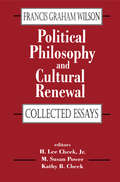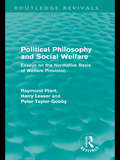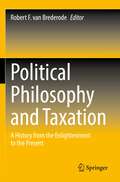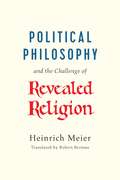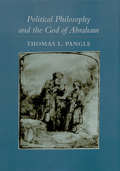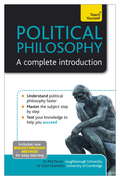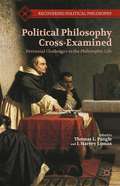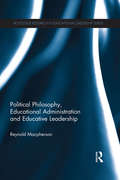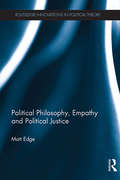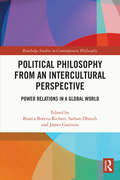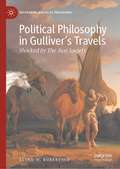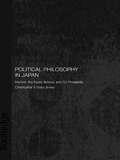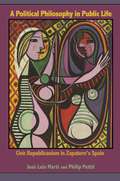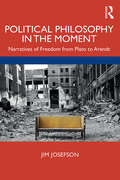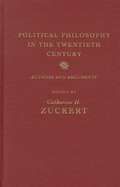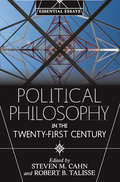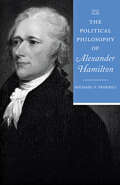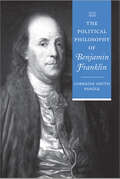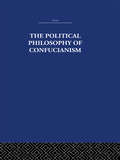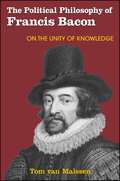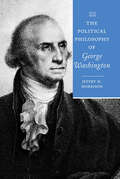- Table View
- List View
Political Philosophy and Cultural Renewal: Collected Essays of Francis Graham Wilson (Library Of Conservative Thought Ser.)
by Francis WilsonFrancis Graham Wilson was a central figure in the revival of interest in political philosophy and American political thought in the mid-twentieth century. While he is best known as a Catholic writer and conservative theorist, his most significant contribution is his original interpretation of the development of American politics. Central to his thought was a process of self-interpretation by the citizenry, a quest for ultimate meaning turning to a divine, transcendent, basis of history and shared experience. Although Wilson's writings were extensive and influential, they have not been readily available for decades.
Political Philosophy and Social Welfare: Essays on the Normative Basis of Welfare Provisions (Routledge Revivals)
by Raymond Plant Peter Taylor-Gooby Anthony LesserThis re-issued work, first published in 1980, represents a work of normative political philosophy which argues positively for the centrality of the obligation to meet the various demands of social need in our society, and will be of particular interest to students of politics, philosophy, social politics and administration. Bringing the insights of analytical Political Philosophy to bear on the issues of social welfare and welfare provision, the authors discuss such issues as the basis of the sense of stigma involved in the receipt of welfare benefits, the right of welfare and the concepts of ‘community’.
Political Philosophy and Taxation: A History from the Enlightenment to the Present
by Robert F. van BrederodeThis book explores how taxation is related to the role of the state and its relationship with its constituents, the concept of private property rights, the concepts of societal fairness and justice, and the battle between the individual and the collective. This book appeals to students and scholars who want to know how philosophers in the past and present think about taxation, and how their thinking has developed through cross-influencing. There exists no comprehensive study providing such an overview. This book is a foundational study on the philosophical justification of taxation (qualitative aspect) and the normative qualifications required of tax law to constitute tax that is just and fair (distributive or quantitative aspect). The latter includes evaluation of what type of tax is morally correct or acceptable to realize distributive justice. This book covers periods from the Enlightenment era until the present. The philosophers are grouped together in schools of thought and each chapter except for chapter 1 and chapter 13, are is dedicated to a specific philosophical school. Moreover, this book aims to provide an overview of each school of thinking and the individual philosophers, including placing them in the context of their times. The book has particular importance as the study of taxation is an underdeveloped area of political and legal philosophy.
Political Philosophy and the Challenge of Revealed Religion
by Heinrich Meier Robert BermanHeinrich Meier’s guiding insight in Political Philosophy and the Challenge of Revealed Religion is that philosophy must prove its right and its necessity in the face of the claim to truth and demand obedience of its most powerful opponent, revealed religion. Philosophy must rationally justify and politically defend its free and unreserved questioning, and, in doing so, turns decisively to political philosophy. In the first of three chapters, Meier determines four intertwined moments constituting the concept of political philosophy as an articulated and internally dynamic whole. The following two chapters develop the concept through the interpretation of two masterpieces of political philosophy that have occupied Meier’s attention for more than thirty years: Leo Strauss’s Thoughts on Machiavelli and Jean-Jacques Rousseau’s Social Contract. Meier provides a detailed investigation of Thoughts on Machiavelli, with an appendix containing Strauss’s original manuscript headings for each of his paragraphs. Linking the problem of Socrates (the origin of political philosophy) with the problem of Machiavelli (the beginning of modern political philosophy), while placing between them the political and theological claims opposed to philosophy, Strauss’s most complex and controversial book proves to be, as Meier shows, the most astonishing treatise on the challenge of revealed religion. The final chapter, which offers a new interpretation of the Social Contract, demonstrates that Rousseau’s most famous work can be adequately understood only as a coherent political-philosophic response to theocracy in all its forms.
Political Philosophy and the God of Abraham
by Thomas L. PangleIn this book noted scholar Thomas L. Pangle brings back a lost and crucial dimension of political theory: the mutually illuminating encounter between skeptically rationalist political philosophy and faith-based political theology guided ultimately by the authority of the Bible. Focusing on the chapters of Genesis in which the foundation of the Bible is laid, Pangle provides an interpretive reading illuminated by the questions and concerns of the Socratic tradition and its medieval heirs in the Christian, Jewish, and Islamic worlds. He brings into contrast the rival interpretive framework set by the biblical criticism of the modern rationalists Hobbes and Spinoza, along with their heirs from Locke to Hegel. The full meaning of these diverse philosophic responses to the Bible is clarified through a dialogue with hermeneutic discussions by leading political theologians in the Judaic, Muslim, and Christian traditions, from Josephus and Augustine to our day. Profound and subtle in its argument, this book will be of interest not only to students and scholars of politics, philosophy, and religion but also to thoughtful readers in every walk of life who seek to deepen their understanding of the perplexing relationship between religious faith and philosophic reason.
Political Philosophy: A Complete Introduction: Teach Yourself
by Phil Parvin Clare ChambersWritten by Phil Parvin and Clare Chambers, who are current political philosophy lecturers and leading researchers, Political Philosophy - The Essentials is designed to give you everything you need to succeed, all in one place. It covers the key areas that students are expected to be confident in, outlining the basics in clear jargon-free English, and then providing added-value features like summaries of key thinkers, and even lists of questions you might be asked in your seminar or exam. The book's structure follows that of most university courses on political philosophy, by looking at the essential concepts within political philosophy (freedom, equality, power, democracy, rights, the state, political obligation), and then looking at the ways in which piolitical philosophers have used these fundamental concepts in order to tackle a range of normative political questions such as whether the state has a responsibility to alleviate inequalities, and what interest liberal and demovratic states should take in the cultural or religious beliefs of citizens. Teach Yourself titles employ the 'Breakthrough method', which is designed specifically to overcome problems that students face. - Problem: 'I find it difficult to remember what I've read.'; Solution: this book includes end-of-chapter questions and summaries, - Problem: 'Most books mention important other sources, but I can never find them in time.'; Solution: this book includes key texts and case studies are summarised, complete with fully referenced quotes ready to use in your essay or exam. - Problem: 'Lots of introductory books turn out to cover totally different topics than my course.'; Solution: this book is written by a current university lecturer who understands what students are expected to know.
Political Philosophy Cross-examined
by Thomas L. Pangle J. Harvey LomaxPolitical societies frequently regard philosophers as potential threats to morality and religion, and those who speak for politics often demand a defense of philosophy. This book will address philosophy as a mode of existence put into question.
Political Philosophy, Educational Administration and Educative Leadership: Political Philosophy, Educational Administration And Educative Leadership (Routledge Research in Educational Leadership)
by Reynold MacphersonIn this book Reynold Macpherson initiates a politically-critical theory of educative leadership as a fresh line of inquiry in the practice, research and theory of educational administration and educational leadership. Divided into four parts, the book introduces the sub-discipline of political philosophy to the field of educational administration, management and leadership. It does this by clarifying the knowledge domain of each and identifying how four political ideologies, specifically pragmatism, communitarianism, communicative rationalism and egalitarian liberalism, have primarily informed and surreptitiously provided contestable justifications for power in the development of practice, research and theory in the field of study. The book goes on to offer three case studies illustrating how political philosophy can be used to interpret how people become leaders and administrators of educational institutions and systems. Additional case studies then demonstrate how crises in governance in educational institutions and systems can be analyzed and improvements made using the tools of political philosophy. The final part uses the sub-discipline to critique the author’s decades of research into educative leadership, and concludes the book by both establishing the relativity of politically-critical critique and the ideology it favours; neo-pragmatism. Political Philosophy, Educational Administration and Educative Leadership will provide practitioners, researchers and theorists in educational administration, management and leadership with a deeper appreciation of power by formally introducing them to the assumptions, limits and tools of political philosophy.
Political Philosophy, Empathy and Political Justice (Routledge Innovations in Political Theory)
by Matt EdgeIn this work, Matt Edge offers an innovative approach to political philosophy. He invites the reader to consider the question of political justice from an empathic perspective - if you were asked to construct a theory of justice acceptable to members of a community you were not yourself a part of, how would you succeed in making your proposal acceptable? What tools would you rely on to construct such a theory, and why? Equally, what would make anyone qualified to write such a theory? Using empathy, this remarkable, natural, tool human beings possess for making moral and ethical decisions, and, thereby, placing yourself as someone on the receiving end of the very theory of justice you yourself are constructing, what would you come up with? What set of alterable human structures and systems would you deem acceptable, were you to find yourself in the position of a citizen living under such structures? Political Philosophy, Empathy and Political Justice offers a unique and compelling account of the type of free system required to pass an empathic examination at the heart of these, and related, questions, matters which define all human eras, in the constant search for political and social justice on our diverse planet.
Political Philosophy from an Intercultural Perspective: Power Relations in a Global World (Routledge Studies in Contemporary Philosophy)
by Bianca Boteva-Richter Sarhan Dhouib James GarrisonThe objective of the following collected volume is to encourage a critical reflection on the relationship between "power" and "non-power" in our contemporary "world" and, proceeding from various philosophical traditions, to investigate the multifaceted aspects of this relationship. The authors’ respective investigations proceed from an intercultural perspective and fall predominantly in the domain of political theory and philosophy. This volume takes an intercultural political perspective, which means, on the one hand, involving non-European philosophies in a global debate about power relations and their effects in the world and, on the other hand, confronting local traditions of thought with a global inquiry in order to enter into a philosophical-political dialogue with these traditions. An intercultural approach of this type to political philosophy seeks not only to join others in reflecting upon global problems, but also to decenter of our understanding of the world, drawing attention to new ways of thinking. Insofar as the authors of the planned volume deal with "concrete" philosophical-political problems unfolding in various regions of the world, they seek to shed light on burning issues like migration, human rights violations, dictatorship and language, global poverty, power asymmetries, experiences of injustice with the further goal of offering a particularly intercultural analysis of these problems along with approaches to resolving them. To date, there is no book that collects various essays from different countries and perspectives and poses political-philosophical problems from an intercultural point of view.
Political Philosophy in Gulliver’s Travels: Shocked by The Just Society (Recovering Political Philosophy)
by Lloyd W. RobertsonThis book analyzes Jonathan Swift’s Gulliver’s Travels from a political philosophy perspective. When authors have focused on politics in Swift’s writings, this has usually meant a study of how Swift located himself on issues of his day such as church and state, and Ireland. Robertson claims by contrast that Gulliver’s Travels is fundamentally a book about the “ancients” (e.g. Plato, Aristotle), and the “moderns” (science and technology), and their contrasting views about the human condition. The claim that the Travels is “a kind of prolegomena” to political philosophy leaves open the possibility that it does not achieve, or seek to achieve, a fusion of various teachings but rather uses the device of alien societies to point us to uncomfortable aspects of political philosophy’s “larger questions” we are prone to ignore. Swift, Robertson argues, draws our attention to some version of the classical republic, as idealized in Aristotle’s political writings and in Plato’s Republic, as opposed to a modern regime which, at its best or most intellectual, emphasizes modern science and technology in combination as a way to improve the human condition.
Political Philosophy in Japan: Nishida, the Kyoto School and co-prosperity (Routledge/Leiden Series in Modern East Asian Politics, History and Media)
by Christopher Goto-JonesPolitical Philosophy in Japan focuses on the politics of Japan's pre-eminent philosophical school - the Kyoto School - and particularly that of its founder, Nishida Kitarô (1870-1945). Existing literature on Nishida is dismissive of there being serious political content in his work, and of the political stance of the wider school. Goto-Jones contends that, far from being apolitical, Nishida's philosophy was explicitly and intentionally political, and that a proper political reading of Nishida sheds new light on the controversies surrounding the alleged complicity of the Kyoto School in Japanese ultra-nationalism. This book offers a unique and potentially controversial view of the subject of Nishida and the Kyoto School.
A Political Philosophy in Public Life: Civic Republicanism in Zapatero's Spain
by José Luis Martí Philip PettitThe story of a Princeton professor's role as the unofficial philosophical adviser to the Spanish governmentThis book examines an unlikely development in modern political philosophy: the adoption by a major national government of the ideas of a living political theorist. When José Luis Rodríguez Zapatero became Spain's opposition leader in 2000, he pledged that if his socialist party won power he would govern Spain in accordance with the principles laid out in Philip Pettit's 1997 book Republicanism, which presented, as an alternative to liberalism and communitarianism, a theory of freedom and government based on the idea of nondomination. When Zapatero was elected President in 2004, he invited Pettit to Spain to give a major speech about his ideas. Zapatero also invited Pettit to monitor Spanish politics and deliver a kind of report card before the next election. Pettit did so, returning to Spain in 2007 to make a presentation in which he gave Zapatero's government a qualified thumbs-up for promoting republican ideals.In this book, Pettit and José Luis Martí provide the historical background to these unusual events, explain the principles of civic republicanism in accessible terms, present Pettit's report and his response to some of its critics, and include an extensive interview with Zapatero himself. In addition, the authors discuss what is required of a political philosophy if it is to play the sort of public role that civic republicanism has been playing in Spain.An important account of a rare and remarkable encounter between contemporary political philosophy and real-world politics, this is also a significant work of political philosophy in its own right.
Political Philosophy In the Moment: Narratives of Freedom from Plato to Arendt
by Jim JosefsonPolitical Philosophy In the Moment uncovers the political power of narrative by both telling and explaining the stories that frame our ability to be "in the moment." In a series of eleven short stories, Jim Josefson presents the history of political philosophy and Hannah Arendt’s alternative, an aesthetic form of politics. In the early stories, Josefson recounts how the four main traditions of political philosophy (Platonism, Aristotelianism, liberalism and historicism) promise truth but deny us the freedom available in reality. Then, he reviews the alternative narratives offered by thinkers like Kierkegaard, Nietzsche and Heidegger, which influenced Arendt’s view. The final chapters chart Arendt’s route back to the Moment, the freedom to read and tell a fuller story about the beauty and horrors that appear in the world. A page-turning book of short stories and a tour through the greatest works of political philosophy, Political Philosophy In the Moment is as approachable, comprehensible and welcoming as a fairy-tale, ideally suited for students of contemporary political theory and anyone interested in political thought.
Political Philosophy in the Twentieth Century
by Catherine ZuckertThis book demonstrates the rich diversity and depth of political philosophy in the twentieth century. Catherine H. Zuckert has compiled a collection of essays recounting the lives of political theorists, connecting each biography with the theorist's life work and explaining the significance of the contribution to modern political thought. The essays are organized to highlight the major political alternatives and approaches. Beginning with essays on John Dewey, Carl Schmitt and Antonio Gramsci, representing the three main political alternatives - liberal, fascist and communist - at mid-century, the book proceeds to consider the lives and works of émigrés such as Hannah Arendt, Eric Voegelin, and Leo Strauss, who brought a continental perspective to the United States after World War II. The second half of the collection contains essays on recent defenders of liberalism, such as Friedrich Hayek, Isaiah Berlin and John Rawls and liberalism's many critics, including Michel Foucault, Jürgen Habermas and Alasdair MacIntyre.
Political Philosophy in the Twenty-First Century: Essential Essays
by Steven M. CahnMoving beyond the work of Rawls and his critics, this concise collection contains critical essays in contemporary political philosophy. All have been chosen for their importance and accessibility, and some have been edited by their authors for inclusion in this work. Political Philosophy in the Twenty-First Century covers five main topics: equality, justice, liberty, democracy, and human rights. To assist readers, the editors have also provided section introduction and study questions as well as an overall introduction explaining the background to contemporary work in political philosophy. Beginning where most other anthologies in political philosophy conclude, this book can be used alone or in conjunction with any collection of historical sources.
The Political Philosophy of Alexander Hamilton (The Political Philosophy of the American Founders)
by Michael P. FedericiAmerica’s first treasury secretary and one of the three authors of the Federalist Papers, Alexander Hamilton stands as one of the nation’s important early statesmen. Michael P. Federici places this Founding Father among the country’s original political philosophers as well.Hamilton remains something of an enigma. Conservatives and liberals both claim him, and in his writings one can find material to support the positions of either camp. Taking a balanced and objective approach, Federici sorts through the written and historical record to reveal Hamilton’s philosophy as the synthetic product of a well-read and pragmatic figure whose intellectual genealogy drew on Classical thinkers such as Cicero and Plutarch, Christian theologians, and Enlightenment philosophers, including Hume and Montesquieu. In evaluating the thought of this republican and would-be empire builder, Federici explains that the apparent contradictions found in the Federalist Papers and other examples of Hamilton’s writings reflect both his practical engagement with debates over the French Revolution, capital expansion, commercialism, and other large issues of his time, and his search for a balance between central authority and federalism in the embryonic American government. This book challenges the view of Hamilton as a monarchist and shows him instead to be a strong advocate of American constitutionalism.Devoted to the whole of Hamilton’s political writing, this accessible and teachable analysis makes clear the enormous influence Hamilton had on the development of American political and economic institutions and policies.
The Political Philosophy of Benjamin Franklin (The Political Philosophy of the American Founders)
by Lorraine Smith PangleThe most famous man of his age, Benjamin Franklin was an individual of many talents and accomplishments. He invented the wood-burning stove and the lightning rod, he wrote Poor Richard's Almanac and The Way to Wealth, and he traveled the world as a diplomat. But it was in politics that Franklin made his greatest impact. Franklin’s political writings are full of fascinating reflections on human nature, on the character of good leadership, and on why government is such a messy and problematic business. Drawing together threads in Franklin's writings, Lorraine Smith Pangle illuminates his thoughts on citizenship, federalism, constitutional government, the role of civil associations, and religious freedom.Of the American Founders, Franklin had an unrivaled understanding of the individual human soul. At the heart of his political vision is a view of democratic citizenship, a rich understanding of the qualities of the heart and mind necessary to support liberty and sustain happiness. This concise introduction reflects Franklin's valuable insight into political issues that continue to be relevant today.
The Political Philosophy of Benjamin Franklin (The Political Philosophy of the American Founders)
by Lorraine Smith Pangle“One of the very finest introductions to this remarkable American’s thought.” —Ralph Ketcham, Claremont Review of BooksHe invented the wood-burning stove and the lightning rod, he wrote Poor Richard’s Almanac and The Way to Wealth, and he traveled the world as a diplomat. But it was in politics that Benjamin Franklin made his greatest impact.Franklin’s political writings are full of fascinating reflections on human nature, on the character of good leadership, and on why government is such a messy and problematic business. Drawing together threads in Franklin’s writings, Lorraine Smith Pangle illuminates his thoughts on citizenship, federalism, constitutional government, the role of civil associations, and religious freedom.Of the American Founders, Franklin had an unrivaled understanding of the individual human soul. At the heart of his political vision is a view of democratic citizenship, a rich understanding of the qualities of the heart and mind necessary to support liberty and sustain happiness. This concise introduction reflects Franklin’s valuable insight into political issues that continue to be relevant today.
The Political Philosophy of Confucianism: An interpretation of the social and political ideas of Confucius, his forerunners, and his early disciples.
by Leonard Shihlien HsüFirst published in 1932.One of the most astonishing features of the Confucian teaching to the modern reader is its anticipation of the Spencerian formula of evolution and its adaptation of this to a programme of progress. This volume shows that Confucius' teaching is still relevant in many of its features, not merely for China but also for the West. Contents include: The background of Confucian political philosophy; the state and its origin; political unity and organization; the principle of benevolent government; law and justice; democracy and representation, social evolution.
The Political Philosophy of Francis Bacon: On the Unity of Knowledge
by Tom van MalssenComprehensive in its ambitions and meticulous in its approach, The Political Philosophy of Francis Bacon is a new and unique interpretation of one of early modernity's more important thinkers. Whereas recent works on Bacon tend to confine themselves either to interpreting his historical context or to considering the founder of Baconianism from the perspective of one work in particular or the history of science in general, Tom van Malssen argues, through detailed and provocative interpretations of a number of Baconian writings, that the unity of Bacon's thought can only be revealed if these writings are read in historical and philosophical conjunction as well as on the assumption that they are all somehow part of the whole of Bacon's political philosophy. In addition to restoring Bacon to the pantheon of great philosophers, Van Malssen demonstrates that a proper understanding of Bacon's political philosophy contributes significantly to our understanding of the nature of philanthropic science, the modern project, and ultimately ourselves.
The Political Philosophy of George Washington (The Political Philosophy of the American Founders)
by Jeffry H. MorrisonGeorge Washington is revered as the father of his country, a clever and skilled general, and a man of restrained principle—but not as a political thinker. This short introduction to Washington's political philosophy reveals him as a thoughtful public intellectual who was well equipped to lead the young United States.Though Washington left little explicit writing on political philosophy, Jeffry Morrison examines his key writings, actions, education, and political and professional lives. He finds that Washington held closely to a trinity of foundational principles—classical republicanism, British liberalism, and Protestant Christianity—with greater fidelity than many of the other founding fathers. In unearthing Washington's ideological growth, Morrison reveals the intellectual heritage of his political thought and shows how these beliefs motivated him to action. This insightful, concise story makes clearer the complexities of the revolutionary era and shows how the first president's political ideas shaped governmental institutions and instantiated the nation's foundational principles.
The Political Philosophy of George Washington (The Political Philosophy of the American Founders)
by Jeffry H. Morrison&“A delight . . . rewarding insight into Washington and his times . . . and an illuminating section on the religious outlook of this American founder.&” —Journal of American History George Washington is revered as the father of his country, a clever and skilled general, and a man of restrained principle—but not as a political thinker. This short introduction to Washington&’s political philosophy reveals him as a thoughtful public intellectual who was well equipped to lead the young United States. Though Washington left little explicit writing on political philosophy, Jeffry Morrison examines his key writings, actions, education, and political and professional lives. He finds that Washington held closely to a trinity of foundational principles—classical republicanism, British liberalism, and Protestant Christianity—with greater fidelity than many of the other founding fathers. In unearthing Washington&’s ideological growth, Morrison reveals the intellectual heritage of his political thought and shows how these beliefs motivated him to action. This insightful, concise story makes clearer the complexities of the revolutionary era and shows how the first president&’s political ideas shaped governmental institutions and instantiated the nation&’s foundational principles. &“Those who accept the &‘dumb general&’ caricature should be chastened by Morrison&’s elegant and concise sampling of Washington&’s writings . . . This work deserves to be studied and debated by political scientists, historians, and public intellectuals concerned with America&’s fundamental political principles and those of liberal democracy.&” —Review of Politics
The Political Philosophy of Hobbes: Its Basis and Its Genesis
by Leo StraussIn this classic analysis, Leo Strauss pinpoints what is original and innovative in the political philosophy of Thomas Hobbes. He argues that Hobbes's ideas arose not from tradition or science but from his own deep knowledge and experience of human nature. Tracing the development of Hobbes's moral doctrine from his early writings to his major work The Leviathan, Strauss explains contradictions in the body of Hobbes's work and discovers startling connections between Hobbes and the thought of Plato, Thucydides, Aristotle, Descartes, Spinoza, and Hegel.
The Political Philosophy of Hobbes
by Leo Strauss Elsa M. SinclairIn this classic analysis, Leo Strauss pinpoints what is original and innovative in the political philosophy of Thomas Hobbes. He argues that Hobbes's ideas arose not from tradition or science but from his own deep knowledge and experience of human nature. Tracing the development of Hobbes's moral doctrine from his early writings to his major work The Leviathan, Strauss explains contradictions in the body of Hobbes's work and discovers startling connections between Hobbes and the thought of Plato, Thucydides, Aristotle, Descartes, Spinoza, and Hegel.
